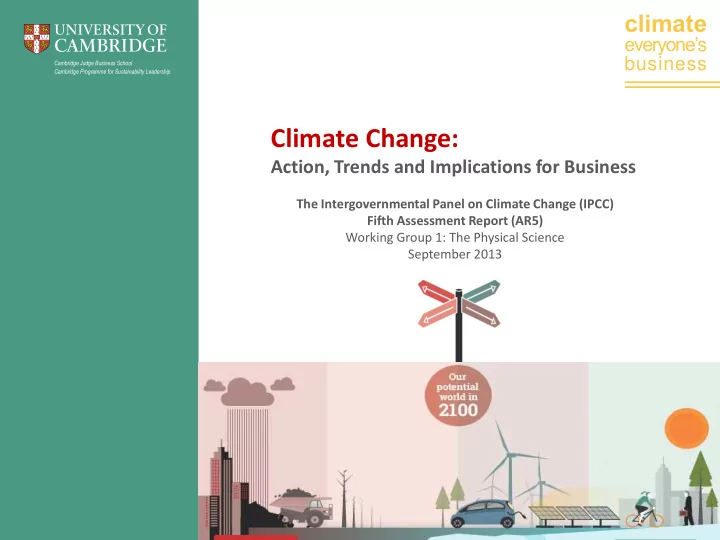

climate everyone’ s business Cambridge Judge Business School Cambridge Programme for Sustainability Leadership Climate Change: Action, Trends and Implications for Business The Intergovernmental Panel on Climate Change (IPCC) Fifth Assessment Report (AR5) Working Group 1: The Physical Science September 2013
climate Climate Change: Action, Trends and Implications for Business everyone’ s IPCC Fifth Assessment Report, Working Group 1 (WGI) business The IPCC’s Fifth Assessment Report (AR5) The most up-to-date info on climate change Comprehensive and relevant analysis Working Group 1 (WGI) Assesses the physical environment and observes factors likely driving climate change. Models different aspects of climate change and projects changes by the end of the century. WGII (economy and population) and WGIII (climate change mitigation) reports will be released Q2 2014.
climate everyone’ s WGI Key Findings: Physical science business Human activities are causing a rise in global temperatures - particularly from emissions of CO 2 . The atmosphere and oceans are warming Snow and ice are diminishing Sea levels are rising Weather patterns are changing Oceans are acidifying It is at least 95% certain that human activities have caused more than half of the temperature increase since the 1950s, through the burning of fossil fuels and land-use changes such as deforestation . At present, there is a net uptake of energy by the Earth system , increasing heat energy stored by the Earth. Over 90% of the excess heat is stored in the ocean .
climate everyone’ s WGI Key Findings: Future climate change business Climate changes are already occurring in all geographical regions. Impacts by the end of the 21 st century may include: o C higher than present Global temperatures 2.6 - 4.8 Sea levels 0.45 - 0.82 m higher than present Loss of Arctic sea ice from shrinking and thinning Disruption to weather patterns: More hot and fewer cold days globally Longer and more frequent heatwaves Dry areas will become drier and wet areas wetter Carbon uptake will increase ocean acidification ‘ Tipping point ’ events (causing irreversible change) are possible, though there is little agreement on how likely they are or what the human consequences would be. Due to historic emissions in the atmosphere, many changes will continue for hundreds or thousands of years even if emissions are cut to zero today .
climate everyone’ s WGI Key Findings: Limiting warming business Total cumulative human CO 2 emissions since Limiting climate change will require the industrial era need to be limited. substantial and sustained reductions of greenhouse gas and CO 2 emissions relative to pre-industrial levels . o C target 2 Parties to the 2010 UN Framework Convention on Climate Change (UNFCCC) agreed to commit to a o C maximum temperature rise of 2 above pre-industrial levels to prevent the most severe impacts of climate change , and to consider lowering that o C in the near future. maximum to 1.5 Past Present About half already emitted by 2011
climate everyone’ s WGI Representative Concentration Pathways (RCPs) business Four scenarios project how the climate is likely to change over the 21 st century. The RCP number indicates the strength of climate change by 2100.* * These scenarios depend on future levels of greenhouse gas emissions. The trajectory of emissions mainly depends on policy choices made by governments .
climate What climate change means for business everyone’ s business Rising temperatures, rising sea levels, changes in rainfall patterns, disappearing glaciers and acidifying seawater will have direct impacts on some business sectors . Government policy changes will bring different sets of impacts for business . Limiting climate change will require substantial and sustained reductions of emissions .
Cambridge Judge Business School Cambridge Programme for Sustainability Leadership For more information Tim Nuthall, Project Director Joanna Benn, Managing Editor Email: AR5@europeanclimate.org www.cpsl.cam.ac.uk/ipcc www.europeanclimate.org
Recommend
More recommend